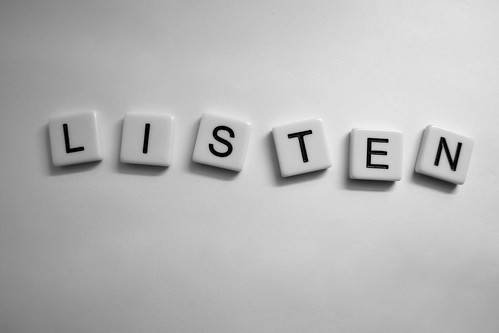Listen and learn! Posted by Kasia on Jul 3, 2014 in Uncategorized
Each person is different and each person learns a new language in many different ways! What works for one person, may not quite work as well for the other…:)
So what works for you? What’s the easiest and the most efficient way to learn all the grammar rules, words and everything about the new language? I have picture memory…so I remember what I see. I also like to listen to the music and learn language that way.
Listening (słuchanie) is accompanied by speaking (mówienie), reading (czytanie) and writing (pisanie). But listening comes first. After listening to one person or even to a small group of Polish speakers it is necessary to extend the experience. Ideally, someone, who is no longer a beginner, should listen to as many different types of spoken Polish as possible. By different types I mean the conversations participated in and overheard in all sorts of everyday situations in Poland. Of course this means coming to Poland, with a friend, buying railway tickets, shopping, eating in restaurants and cafes and listening, all the time listening. I started teaching my husband Polish a while ago…but I have to say, that he learned the most once we started going to Poland and spending 3-4 weeks there. Listening to all my friends, family and strangers on the street, listening to the news made a huge difference!
There is the language used by children and teenagers on the trams returning from school. None of it will be recorded, but it all conveys the pattern of the language. Buying something, even if you do not need it and it is just that the experience is interesting. The conversation is different first there is the enquiry, are there any others? What about this, what about that? How much does it cost? Such real-life experiences are much more valuable and intense than textbook or tape cassette exercises. Stop someone on the street and ask the way to somewhere, perhaps best to somewhere that you already know the way to. Apologise for the interruption, ask them if they would tell you the way to the railway station.
Find out how much you can understand of the news on Polish television, delivered rapidly and not especially clearly by the newsreaders. Testing one’s proficiency in real situations is far more rewarding than in the condition of student and teacher. Of course the more one understands about a people the more one comprehends their language. Did language shape the pattern of thought? Or was it the other way round? The question will perhaps never be resolved but undoubtedly there is a strong correlation between language and thought. Language links thought to behaviour, thus learning in “battlefield conditions” provides the student with the interesting experience watching the effect that an individual language has when delivered by its speakers to each other.
Please let us know in comments below what works the best for you while learning a new language:)
Do następnego razu… (Till next time…)

Build vocabulary, practice pronunciation, and more with Transparent Language Online. Available anytime, anywhere, on any device.
About the Author: Kasia
My name is Kasia Scontsas. I grew near Lublin, Poland and moved to Warsaw to study International Business. I have passion for languages: any languages! Currently I live in New Hampshire. I enjoy skiing, kayaking, biking and paddle boarding. My husband speaks a little Polish, but our daughters are fluent in it! I wanted to make sure that they can communicate with their Polish relatives in our native language. Teaching them Polish since they were born was the best thing I could have given them! I have been writing about learning Polish language and culture for Transparent Language’s Polish Blog since 2010.




